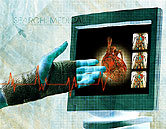
WEDNESDAY, July 13 (HealthDay News) — People with HIV are at increased risk for blood vessel blockages, and new research shows heart ultrasounds can help determine if these patients are more likely to suffer a serious or fatal heart attack.
A report from the American Heart Association revealed that the risk for heart attack among people with HIV who have abnormal heart ultrasound tests or “stress echoes” is 10 times greater than in the general population and more than three times higher than in people without HIV who have abnormal heart ultrasounds.
“We looked at whether stress echo can help predict risk in a high-risk group — HIV patients with known or suspected heart disease — and determine whether they have a high or low risk of heart attack and death in the future,” the study’s senior author, Dr. Farooq A. Chaudhry, associate professor of medicine at Columbia University College of Physicians and Surgeons and associate chief of cardiology and director of echocardiography at St. Luke’s Roosevelt Hospital Center in New York City, said in an American Heart Association news release.
In conducting stress echoes on 311 HIV patients averaging 52 years of age with known or suspected heart disease, researchers found that 26 percent had abnormal ultrasounds. Within an average of about three years, there were 14 cardiac deaths and 17 nonfatal heart attacks.
The study authors concluded that the HIV patients who had normal stress echo tests had on average a less than 1 percent per year risk for serious or fatal heart attack — the same risk as in the general healthy population. In sharp contrast, the risk of heart attack among the HIV patients with abnormal stress echo test results was almost 12 percent per year.
The study, published in the current issue of Circulation: Cardiovascular Imaging, found that 100 percent of HIV patients with normal heart ultrasounds survived in the year following the test and 98 percent were alive at four years. Those survival rates dropped to 92 percent at one year and 62 percent at four years for people with HIV that had abnormal stress echoes, the report indicated.
“Although we did not study which treatments are most effective for these patients, HIV patients who have abnormal stress echocardiography should probably be monitored and treated more aggressively to prevent heart attack and death,” said Chaudhry. “Conversely, patients with a normal stress echo might not need such aggressive interventions.”
More information
The American Heart Association provides more information on HIV and the heart.

